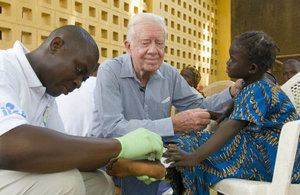UK partners with Jimmy Carter to eradicate Guinea Worm
Britain is working with the Carter Center in the push to beat Guinea Worm supporting its treatment and prevention.

President Carter tries to comfort 6 year old Ruhama Issah at Savelugu Hospital as a Carter Center Volunteer, Adams Bawa, dresses her extremely painful guinea worm wound. The Carter Center/L. Gubb
Britain is partnering with The Carter Center to help make Guinea worm only the second human disease in history to be eradicated, International Development Minister Nick Hurd and former US President Jimmy Carter announced today.
The UK’s Department for International Development is providing £4.5 million in new support for the Carter Center’s Guinea Worm Eradication Programme.
The funding will pay for health volunteers, water filters and larvicide in the few remaining endemic villages in South Sudan, Ethiopia, Chad and Mali. It will also support surveillance campaigns in 6000 villages across these four remaining endemic countries as well as education campaigns to ensure the disease doesn’t resurface.
Guinea worm disease is a parasite caused by drinking infected water. The worm grows inside the body, causing severe pain for up to a year. The worm, which can reach up to a metre in length, eventually emerges through the skin, usually from the leg, causing intense pain and disability which can last for months.
The Carter Center began leading the international campaign to eradicate Guinea worm disease in 1986, when there were an estimated 3.5 million cases annually in Africa and Asia. Last month the Center announced that only 22 people worldwide had contracted the disease in 2015.
UK International Development Minister Nick Hurd said:
Guinea worm is a truly horrendous disease, causing unimaginable pain and suffering. The fact that we are now so close to eradicating it is one of the great public health success stories of modern times.
The tremendous progress we have made in tackling this disease would not have been possible without the personal commitment of Jimmy Carter and his Carter Center. UK aid has played a key role supporting their efforts, but it’s clear that without continued backing there is a real risk of a resurgence in the disease.
This new aid package from the UK will fund the last push to eradicate Guinea Worm, supporting the treatment, prevention and education campaigns needed to finally consign this disease to the history books.
Former US President Jimmy Carter said:
Guinea worm eradication is possible because of the steadfast support from partners like the British government. The UK continues to demonstrate its willingness and staying power to eradicate this debilitating disease, and today’s newest pledge is another example of DFID’s commitment.
The UK has been one of the world’s largest supporters of the Guinea worm eradication campaign, providing £30 million to the Carter Center’s Guinea Worm Eradication Programme between 2009 and 2015.
President Carter is visiting London to focus on Carter Center health efforts, including the launch of the international display of the exhibition Countdown to Zero: Defeating Disease. The exhibition was created by the American Museum of Natural History in collaboration with The Carter Center and is on display at the London School of Hygiene & Tropical Medicine from 5 February-6 May, 2016.
Editor’s note
President Carter will visit the House of Lords in the Palace of Westminster on Wednesday 3 February to deliver a lecture on the eradication of Guinea worm disease, as part of the Lord Speaker’s global lecture series. His lecture will be livestreamed beginning at 5.30pm GMT on Parliament TV and on the Carter Center website. President Carter’s lecture will be followed by a question & answer session, and the public can submit questions to President Carter on Twitter using #askJimmyCarter. Follow the conversation live via @cartercenter
General media queries (24 hours)
Email mediateam@dfid.gov.uk
Telephone 020 7023 0600
If you have an urgent media query, please email the DFID Media Team on mediateam@dfid.gov.uk in the first instance and we will respond as soon as possible.